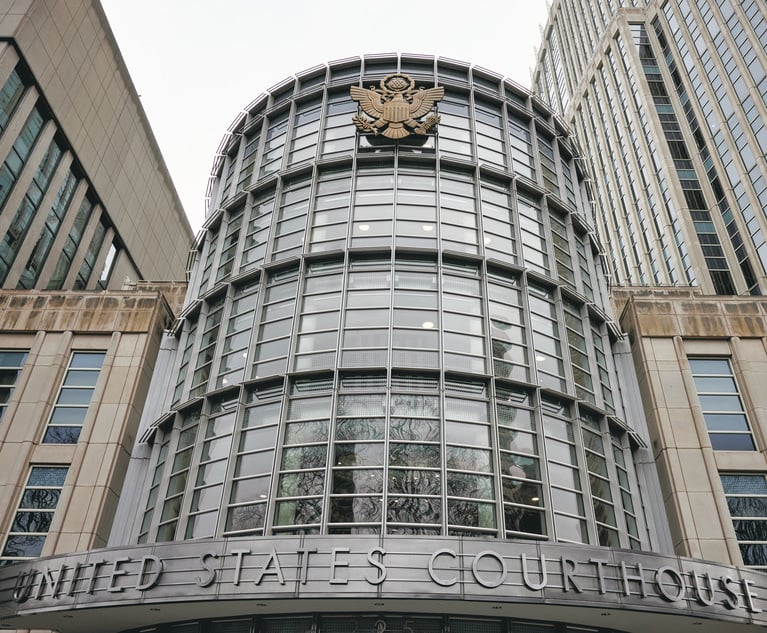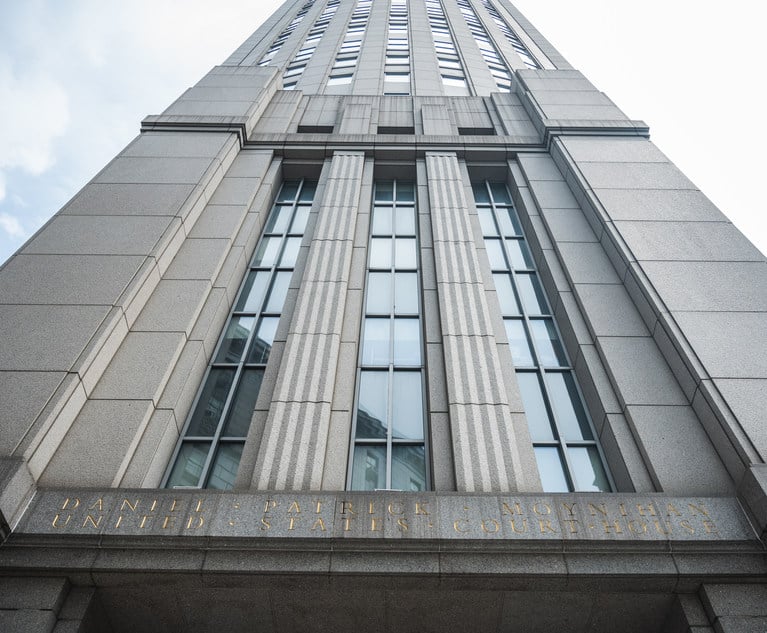 World AIDS Day awareness campaign in Kolkata, India, last month. (AP photo/Bikas Das)
World AIDS Day awareness campaign in Kolkata, India, last month. (AP photo/Bikas Das)Divided 2nd Circuit Panel Loosens Restriction on Support for Programs Fighting HIV/AIDS
The majority pointed to previous actions by the same parties before the Supreme Court to extend First Amendment protections to foreign affiliates of U.S.-based organizations, a move the dissent argued usurped circuit precedent.
December 20, 2018 at 04:17 PM
5 minute read
A split appellate panel decision Thursday highlighted the long-running debate over government restrictions on foreign aid, providing a win for groups combating HIV and AIDS abroad but inviting a vigorous dissent that accused the majority of overturning the circuit's own long-held precedent.
On its face, the majority's decision in Alliance for Open Society International v. U.S. Agency for International Development was a victory for U.S.-based organizations focused on fighting HIV and AIDS abroad through foreign affiliates. The majority, composed of U.S. Circuit Judges Barrington Parker and Rosemary Pooler, noted that the specific issue had been before them on its way to the U.S. Supreme Court.
The Supreme Court's 2013 decision between the same parties affirmed the finding that the Leadership Against HIV/AIDS, Tuberculosis, and Malaria Act of 2003 violated the First Amendment by compelling federally funded organizations to have explicit policies opposing prostitution and sex trafficking. The organizations generally attested to being opposed to prostitution but, in the course of their work, often interacted directly with sex worker communities and therefore wouldn't adopted a prohibitive stance.
Since that Supreme Court decision, the same plaintiffs alleged in the current suit that the federal government interpreted the order to mean no domestic groups could be denied funding, but that the order didn't extend abroad.
The majority noted over the course of multiple pages in its decision that the domestic organizations and their foreign affiliates appear and act as virtual wholes, even where separations between the groups may occur for legal or other reasons.
As such, international aid organizations are “organized as formally legally distinct entities while operating with a unified and consistent identity, mission, and work,” the majority pointed out.
“As a consequence, these organizations appear to the public as unified entities,” the judges noted.
This proximity interpretation was key to the majority's ruling upholding the permanent injunction against the government put in place by U.S. District Judge Victor Marrero of the Southern District of New York in 2015. At multiple points the majority pointed to Chief Justice John Roberts' concerns about “evident hypocrisy” forced on the organizations by the government's policy, a position the majority referred as its “lodestar” in its decision.
“[W]hen the Government requires contrasting, hypocritical messages between domestic and foreign affiliates by making one speak the Government's message, this requirement infringes the speech of the domestic affiliate and, in so doing, violates the First Amendment,” the majority said.
In his dissent, U.S. Circuit Judge Chester Straub argued the majority misread the Supreme Court's earlier decision, which he argued only applied to U.S.-based organization.
In doing so, Straub argued, the majority ran afoul of two critical precedential decisions in the circuit, 2002's Center for Reproductive Law & Policy v. Bush and 1990's Planned Parenthood Federation of America v. USAID. Both decisions held the government's foreign policy interests “outweighs any incidental impact” on domestic organizations as it related to government funding of groups based on their abortion positions.
The majority's decision, then, “overrules those cases without even the benefit of an en banc review and effectively extends First Amendment rights to foreign organizations operating outside the United States by treating 'clearly identified' domestic and foreign organizations as a single entity for First Amendment purposes.”
The majority—adding in a footnote that Straub's argument in a dissent in the previous stage of the case that the policy at issue wasn't a constitutional violation was “subsequently rejected squarely” by the Supreme Court—argued Straub sought to characterize the issue as one of freedom of association, not of speech. In doing so, the dissent “misunderstands both the nature of the right at issue and the Supreme Court's decision.”
“The [Supreme] Court made clear that it conceived of the issue as one involving freedom of speech, stating several times that its animating concerns were the ability of the funding recipient 'to express its beliefs,'” the majority said. “Contrary to the assertions made in the dissent, the cases involving freedom of association are not particularly helpful.”
“We welcome this ruling,” said a spokeman for the Open Society Foundation. “In addition to violating our constitutional rights, the pledge was also bad public health policy, because it harmed efforts to limit HIV infection rates among sex workers. The courts have spoken loud and clear: we trust the government will now do the right thing and stop undermining this important global public health work.”
A spokesman for USAID declined to comment, referring questions to the Department of Justice. A spokesman for the U.S. Attorney's Office for the Southern District of New York, which handled the case on appeal, also declined to comment.
The original plaintiffs in the suit were represented by the legal team led by Wilmer Cutler Pickering Hale and Dorr partner David Bowker. Neither the firm nor its clients immediately responded to a request for comment.
This content has been archived. It is available through our partners, LexisNexis® and Bloomberg Law.
To view this content, please continue to their sites.
Not a Lexis Subscriber?
Subscribe Now
Not a Bloomberg Law Subscriber?
Subscribe Now
NOT FOR REPRINT
© 2024 ALM Global, LLC, All Rights Reserved. Request academic re-use from www.copyright.com. All other uses, submit a request to [email protected]. For more information visit Asset & Logo Licensing.
You Might Like
View All
'No Evidence'?: Big Law Firms Defend Academic Publishers in EDNY Antitrust Case
3 minute read

Dapper Labs $4M Settlement, $1.3M in Attorney Fees Reveal NFT Settlement Trend
4 minute read
Syracuse Courtroom Dedicated to Trailblazing City Court Judge Langston McKinney
Trending Stories
- 1Infant Formula Judge Sanctions Kirkland's Jim Hurst: 'Overtly Crossed the Lines'
- 2Abbott, Mead Johnson Win Defense Verdict Over Preemie Infant Formula
- 3Preparing Your Law Firm for 2025: Smart Ways to Embrace AI & Other Technologies
- 4Meet the Lawyers on Kamala Harris' Transition Team
- 5Trump Files $10B Suit Against CBS in Amarillo Federal Court
Who Got The Work
Michael G. Bongiorno, Andrew Scott Dulberg and Elizabeth E. Driscoll from Wilmer Cutler Pickering Hale and Dorr have stepped in to represent Symbotic Inc., an A.I.-enabled technology platform that focuses on increasing supply chain efficiency, and other defendants in a pending shareholder derivative lawsuit. The case, filed Oct. 2 in Massachusetts District Court by the Brown Law Firm on behalf of Stephen Austen, accuses certain officers and directors of misleading investors in regard to Symbotic's potential for margin growth by failing to disclose that the company was not equipped to timely deploy its systems or manage expenses through project delays. The case, assigned to U.S. District Judge Nathaniel M. Gorton, is 1:24-cv-12522, Austen v. Cohen et al.
Who Got The Work
Edmund Polubinski and Marie Killmond of Davis Polk & Wardwell have entered appearances for data platform software development company MongoDB and other defendants in a pending shareholder derivative lawsuit. The action, filed Oct. 7 in New York Southern District Court by the Brown Law Firm, accuses the company's directors and/or officers of falsely expressing confidence in the company’s restructuring of its sales incentive plan and downplaying the severity of decreases in its upfront commitments. The case is 1:24-cv-07594, Roy v. Ittycheria et al.
Who Got The Work
Amy O. Bruchs and Kurt F. Ellison of Michael Best & Friedrich have entered appearances for Epic Systems Corp. in a pending employment discrimination lawsuit. The suit was filed Sept. 7 in Wisconsin Western District Court by Levine Eisberner LLC and Siri & Glimstad on behalf of a project manager who claims that he was wrongfully terminated after applying for a religious exemption to the defendant's COVID-19 vaccine mandate. The case, assigned to U.S. Magistrate Judge Anita Marie Boor, is 3:24-cv-00630, Secker, Nathan v. Epic Systems Corporation.
Who Got The Work
David X. Sullivan, Thomas J. Finn and Gregory A. Hall from McCarter & English have entered appearances for Sunrun Installation Services in a pending civil rights lawsuit. The complaint was filed Sept. 4 in Connecticut District Court by attorney Robert M. Berke on behalf of former employee George Edward Steins, who was arrested and charged with employing an unregistered home improvement salesperson. The complaint alleges that had Sunrun informed the Connecticut Department of Consumer Protection that the plaintiff's employment had ended in 2017 and that he no longer held Sunrun's home improvement contractor license, he would not have been hit with charges, which were dismissed in May 2024. The case, assigned to U.S. District Judge Jeffrey A. Meyer, is 3:24-cv-01423, Steins v. Sunrun, Inc. et al.
Who Got The Work
Greenberg Traurig shareholder Joshua L. Raskin has entered an appearance for boohoo.com UK Ltd. in a pending patent infringement lawsuit. The suit, filed Sept. 3 in Texas Eastern District Court by Rozier Hardt McDonough on behalf of Alto Dynamics, asserts five patents related to an online shopping platform. The case, assigned to U.S. District Judge Rodney Gilstrap, is 2:24-cv-00719, Alto Dynamics, LLC v. boohoo.com UK Limited.
Featured Firms
Law Offices of Gary Martin Hays & Associates, P.C.
(470) 294-1674
Law Offices of Mark E. Salomone
(857) 444-6468
Smith & Hassler
(713) 739-1250






